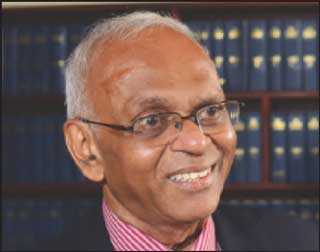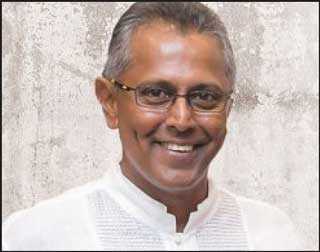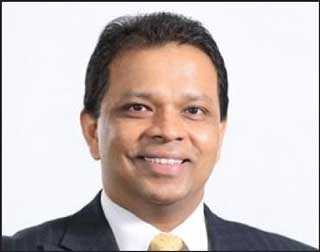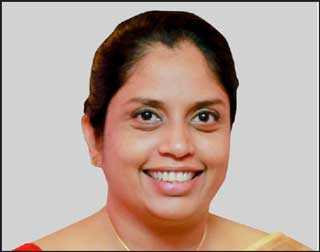Saturday Feb 21, 2026
Saturday Feb 21, 2026
Friday, 10 April 2020 00:00 - - {{hitsCtrl.values.hits}}
The apparel, tourism and IT industries yesterday expressed confidence in surviving the impact of COVID-19 on the economy if the right policy measures are put in place, and the hospitality industry said
 |
Former Central Bank
|
 |
Jetwing Hotels Chairman Hiran Cooray |
 |
Brandix Group Finance Director Hasitha Premaratne |
 |
HNB Managing Director
|
 |
IronOne Technologies and BoardPAC Co-founder and CEO Lakmini Wijesundera |
the Government had a key role to play in protecting the industry.
The hospitality industry has been badly affected and noted it could not show much optimism in the current situation but expressed the need to look at innovative ways to boost the industry in the coming months. The apparel industry and the IT industry shared similar views, although these industries have more potential for innovation even in the current context.
Speaking at a webinar titled ‘Economics of COVID-19’ organised by the Daily FT and MBA Alumni Association of University of Colombo with TIIKM as technical partner, key persons from the above industries as well as the financial sector shared their views on how companies are facing the current situation, as well as strategies required post COVID-19.
On the panel was Jetwing Hotels Chairman Hiran Cooray, who admitted to feeling helpless in the situation, mainly due to the suspension of flights, which is how a large portion of tourists visit the country. He explained that while restrictions like suspension of flights and curfew regulations are much needed, they limit the options hoteliers and travel agents have.
While these restrictions have a direct impact on the industry, Cooray said that at present, the industry is operating business without any income. He added that while the Government has introduced certain measures to ease the burden on the industry, such as the moratorium on capital and interest payment, these would not be sufficient in the next few months.
He added that the Government plays a key role in protecting the industry so that they are able to restart business, as well as protecting the industry’s highly trained workforce. Despite a lack of optimism early on, during the latter part of the discussion, Cooray appeared to be more hopeful and said, “Tourism is not dead, it’s in a slumber. We will come back.”
He added that they currently had no bookings for the winter season, for which bookings are usually made nine to 12 months in advance, and that it would be a miracle to have a good winter. However, he added, “We have to find ways to get enough business to keep our staff going.”
Ayurveda is one potential area, he said, explaining that most hotels are now equipped with Ayurveda doctors and wellness. “That’s something we should work on immediately for this winter and show the world that we are right on top of it,” he added.
The apparel sector was also somewhat affected by the seasons, and Brandix Group Finance Director Hasitha Premaratne said the orders they currently had were for summer/fall, but that brands were now preparing for their winter collections, for which orders will be made from May to September.
Speaking about the impact of COVID-19 on the industry, Premaratne called the problem unprecedented and severe, and said that contingency plans became pointless in the situation within a short time.
He added that the apparel exports industry was one of the worst affected in the country, and that exports have more or less come to a standstill due to the lockdown of the US and European markets.
Premaratne explained that various parts of the apparel industry would be affected differently, saying, “There are clear winners and losers in the product categories that you can define and identify, but it is important for all of us to acknowledge that the demand side will take a long-term dip.” He added that this meant that demand would not recover within the next two to three months.
However, China had started reviving its market, and thus the country should start moving on in terms of manufacturing. The challenge with supplying to orders that may come in is that production is low, due to curfew in Sri Lanka as well as lockdowns in other countries.
Apart from demand, capacity is another major concern, and Premaratne said the industry was actively moving to gradually pick up and build capacity over the next two to three months. “The good news is that in the last 10 days, we have been seeing a change. On one side, we are seeing some level of positive momentum when it comes to the regular orders, because some of the retailers are already picking up and looking at going through online channels,” he added.
The industry has also looked at alternatives in terms of products being manufactured, for instance, with the production of personal protective equipment (PPE) kits and face masks. Changes will also be seen in how businesses operate, with working remotely being an option many will consider.
However, he showed concern about salaries, saying there may be salary cuts and job losses if the situation does not improve. “Cash is king in a crisis so obviously you have to protect the cash flow,” Premaratne said, adding that while safety was the top priority, their second priority was the safety of staff income.
The uncertainty of the situation has also affected the IT industry, and IronOne Technologies and BoardPAC Co-founder and CEO Lakmini Wijesundera said, “In February, we were heading for a really good year and increasing capacity, but within a couple of weeks the whole situation changed. And now we’re suddenly unable to get money due to various reasons.”
She added that they were unable to immediately cope with the initial shock, but that there was also huge potential for the industry given the situation. As an example, social distancing measures have resulted in meetings being held online as opposed to face-to-face and this has neutralised the disadvantages local IT companies had against US vendors.
However, these advantages cannot be generalised across the industry, and Wijesundera explained that since the IT industry serves all other industries, the impact depends on the industry served by the IT company. “Many of the smaller companies don’t have that diversity, and if they are in industries that had a stall, they will be highly affected,” she added.
While the IT, hospitality, and apparel industries were affected by the COVID-19 pandemic in different ways, focus was also drawn to the financial sector, and Hatton National Bank (HNB) Managing Director and CEO Jonathan Alles spoke on the importance of not weakening the financial sector.
He explained that due to the uncertainty of the current situation, people were keeping more cash with them than usual, as they cannot easily visit banks or ATMs to withdraw cash when curfew is imposed.
“There might be some amount of deposits that that will be taken beyond people’s requirements, because they are buying more than what they want as part of their contingency plan,” he said, adding that there was a significant amount of loans yet to be repaid.
Despite the difficulties faced by the sector, Alles said he did not see an increase in interest rates, as even the current rates may be a challenge for people to repay. “So, I would envision that rates would hold at around these levels, and that despite the pressures it would not go up,” he added.
Looking at the bigger picture, Alles said, “In certain parts of the world, you will see borrowings being called upon, which means that we will have to repay some of our borrowings. This may make liquidity even more severe, pending new borrowings made available and these new borrowings may come at slightly higher rates as well.”
Thus, the country may have to look at various instruments like bank funding, equity funding, and long term contracts with the International Monetary Fund and World Bank, as well as credit guarantee schemes.
Shedding more light on how the country’s economy will survive the COVID-19 pandemic, former Central Bank of Sri Lanka (CBSL) Deputy Governor Dr. W.A. Wijewardena said, “All indicators that we get from the macro economy is that the economy would sink by around 10%.” He added that this will continue until 2022 and recovery can only be expected after 2023.
Unfortunately, Sri Lanka will not be able to rely on support from other countries, as the global economy is in as bad a situation as Sri Lanka. “Therefore, our strategy should basically be directed inwards,” Dr. Wijewardena added.
He explained that at present, the Government did not have the capacity to provide support to any industry, mainly due to the tax concessions introduced at the beginning of the year. “In my view, the Government has to immediately revoke the tax reforms that it announced and ask the taxpayers to pay taxes at the old rate, so that at least Sri Lanka will be able to generate a sufficient amount of revenue,” Dr. Wijewardena said.
He added that in the last three weeks, the Government had borrowed heavily from CBSL, and reserve money or the printing of money had increased by around Rs. 100 billion. Dr. Wijewardena explained that this will not work in the long run. “We don’t know when the CBSL will be forced to give up protecting the Sri Lankan rupee,” he added.
Speaking about a balance of payment issue going forward, Dr. Wijewardena said, “We were in a balance of payments crisis from about 2013, and it has exacerbated every year, peaking in 2020. What the Government has done is to curtail some of the inessential imports, which are very small in the total magnitude.”
He also called for State sector reforms, saying that this was a good opportunity to get rid of certain non-essential State sector enterprises. “We can keep the Ceylon Electricity Board and the Ceylon Petroleum Corporation, but we can get rid of all the other things, and it’s a good opportunity for the Government to do that.”
Dr. Wijewardena, while calling for various measures to soften the impact of the pandemic on the economy, however said that the situation can be eradicated in the next three months. The other panellists were also hopeful about the future and, in his closing remarks, Premaratne said he was pretty confident, but that the country will have to downgrade in terms of living standards and spending patterns.
“We won’t be able to bounce back fast enough if not. Then there will be more job losses. But if we tighten the belt and kill the burden, we can then look at alternate revenue measures,” he said.